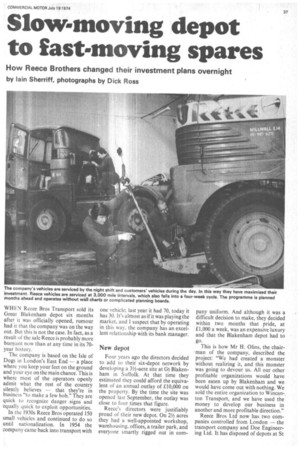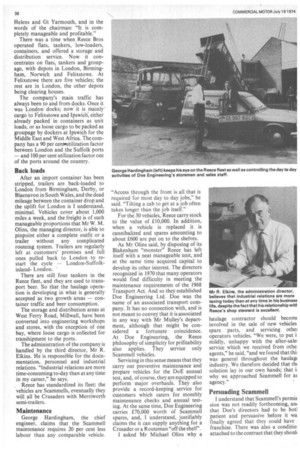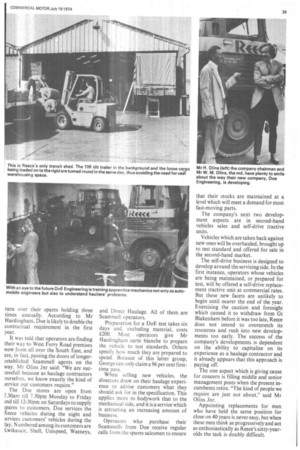Slowmoving depot to fast-moving spares
Page 39

Page 40

Page 41

If you've noticed an error in this article please click here to report it so we can fix it.
How Reece Brothers changed their investment plans overnight by lain Sherriff, photographs by Dick Ross
WHEN Reece Bros Transport sold its Great Blakenham depot six months after it was officially opened, rumour had it that the company was on the way out. But this is not the case. In fact, as a result of the sale Reece is probably more buoyant now than at any time in its 70year history.
The company is based on the Isle of Dogs in London's East End — a place where you keep your feet on the ground and your eye on the main chance. This is where most of the operators openly admit what the rest of the country silently believes — that they're in business "to make a few bob." They are quick to recognize danger signs and equally quick to exploit opportunities.
In the 1930s Reece Bros operated 150 small vehicles and continued to do so until nationalization. In 1954 the company came back into transport with one vehicle; last year it had 70, today it has 30. It's almost as if it was playing the market, and I suspect that by operating in this way, the company has an excellent relationship with its bank manager.
New depot
Four years ago the directors decided to add to their six-depot network by developing a 31/4-acre site at Gt Blakenham in Suffolk. At that time they estimated they could afford the equivalent of an annual outlay of £10,000 on the property. By the time the site was opened last September, the outlay was close to four times that figure.
Reece's directors were justifiably proud of their new depot. On 21/4 acres they had a well-appointed workshop, warehousing, offices, a trailer park, and everyone smartly rigged out in corn pany uniform. And although it was a difficult decision to make, they decided within two months that pride, at £1,000 a week, was an expensive luxury and that the Blakenham depot had to go.
This is how Mr H. Olins, the chair' man of the company, described the project: "We had created a monster without realizing it, and this monster was going to devour us. All our other profitable organizations would have been eaten up by Blakenham and we would have come out with nothing. We sold the entire organization to Wincan-. ton Transport, and we have used the money to develop our business in another and more profitable direction."
Reece Bros Ltd now has two companies controlled from London — the transport company and Doe Engineering Ltd. It has disposed of depots at St Helens and Gt Yarmouth, and in the words of the chairman: "It is completely manageable and profitable."
There was a time when Reece Bros operated flats, tankers, low-loaders, containers, and offered a storage and distribution service. Now it concentrates on flats, tankers and groupage, with depots in London, Birmingham, Norwich and Felixstowe. At Felixstowe there are five vehicles; the rest are in London, the other depots being clearing houses.
The company's main traffic has always been to and from docks. Once it was London docks; now it is mainly cargo to Felixstowe and Ipswich, either already packed in containers as unit loads, or as loose cargo to be packed as groupage by dockers at Ipswich for the Middle East and West Africa. The company has a 90 per centoutilization factor between London and the Suffolk ports — and 100 per cent utilization factor out of the ports around the country.
Back loads
After an import container has been stripped, trailers are back-loaded to London from Birmingham, Derby, or Blaenavon in South Wales, and the dead mileage between the container drop and the uplift for London is I understand, minimal. Vehicles cover about 1,000 miles a week, and the freight is of such manageable proportions that Mr W. M. Olins, the managing director, is able to pinpoint either a complete outfit or a trailer without any complicated routeing system. Trailers are regularly left at customers' premises and full ones pulled back to London to restart the cycle — London-SuffolkinlandLondon. '
There are still four tankers in the Reece fleet, and they are used to transport beer. So that the haulage operation is developing in what is generally accepted as two growth areas — container traffic and beer consumption.
The storage and distribution areas at West Ferry Road, Millwall, have been converted into engineering workshops and stores, with the exception of one bay, where loose cargo is collected for transhipment to the ports.
The administration of the company is handled by the third director, Mr R. Elkins. He is responsible for the documentation, personnel and industrial relations. "Industrial relations are more time-consuming to-day than at any time in my career," he says.
Reece has standardized its fleet: the vehicles are Scammells, eventually they will all be Crusaders with Merriworth semi-trailers.
Maintenance
George Hardingham, the chief engineer, claims that the Scammell maintenance requires 20 per cent less labour than any comparable vehicle. "Access through the front is all that is required for most day to day jobs," he said, "Tilting a cab to get at a job often takes longer than the job itself."
For the 30 vehicles, Reece carry stock to the value of £10,000. In addition, when a vehicle is replaced it is cannibalized and spares amounting to about £600 are put on to the shelves.
As Mr Olins said, by disposing of its Blakenham "monster" Reece has left itself with a neat manageable unit, and at the same time acquired capital to develop its other interest. The directors recognized in 1970 that many operators would find difficulty in meeting the maintenance requirements of the 1968 Transport Act. And so they established Doe Engineering Ltd. Doe was the name of an associated transport company. It has no connection with, and is not meant to convey that it is associated in any way with Mr Mulley's department, although that might be considered a fortunate coincidence. At Doe Engineering, the Reece philosophy of simplicity for prifitability also applies. They service only Scammell vehicles.
Servicing in this sense means that they carry out preventive maintenance and prepare vehicles for the DoE annual test, and, of course, they are equipped to perform major overhauls. They also provide a record-keeping service for customers which caters for monthly maintenance checks and annual testing. At the same time, Doe Engineering carries £70,000 worth of Scammell spares, and, I understand, justifiably claims the it can supply anything for a Crusader or a Routeman "off the shelf'.
I asked Mr Michael Olins why a haulage contractor should becomt involved in the sale of 'new vehicles spare parts, and servicing othei operators vehicles. "We were, to put i. mildly, unhappy with the after-sale! service which we received from ()thei agents," he said, "and we found that thi: was general throughout the haulagt industry. We therefore decided that thc solution lay in our own hands; that why we approached Scammell for at agency."
Persuading Scammell
I understand that Scammell's permis sion was not readily forthcoming, an4 that Doe's directors had to be botl patient and persuasive before it wa finally agreed that they could have franchise. There was also a conditig attached to the contract that they shoulg turn over their spares holding three times annually. According to Mr Hardingham, Doe is likely to double the contractual requirement in the first year.
It was told that operators are finding their way to West Ferry Road premises now from all over the South East, and are, in fact, passing the doors of longerestablished Scammell agents on the way. Mr Olins Jnr said: "We are successful' because as haulage contractors ourselves, we know exactly the kind of service our customers require."
The Doe stores are open from 7.30am till 7.30pm Monday to Friday Ind till I 2-30pm on Saturdays to supply ;pares to customers. Doe services the Reece vehicles during the night and ;ervices customers' vehicles during the lay. Numbered among its customers are (wikasair, Shell, Unispeed, Watneys, and Direct Haulage. All of them are Scammell operators.
Preparation for a DoE test takes six days and, excluding material, costs E200. Most operators give Mr Hardingharn carte blanche to prepare the vehicle to test standards. Others specify how much they are prepared to spend. Because of this latter group, George can only claim a 96 per cent firsttime pass.
When selling new vehicles, the directors draw on their haulage experience to advise customers what they should ask for in the specification. This applies more to bodywork that to the mechanical side, and it is a service which is attracting an increasing amount of business.
Operators who purchase their Scammells from Doe receive regular calls from the spares salesmen to ensure that their stocks are maintained at a level which will meet a demand for most fast-moving parts.
The company's next two development aspects are in second-hand vehicles sales and self-drive tractive units.
Vehicles which are taken back against new ones will be overhauled, brought up to test standard and offered for sale in the second-hand market.
The self-drive business is designed to develop around the servicing side. In the first instance, operators whose vehicles are being maintained, or prepared for test, will be offered a self-drive replacement tractive unit at commercial rates. But these new facets are unlikely to begin until nearer the end of the year. Exercising the caution and foresight which caused it to withdraw from Gt Blaken ham before it was too late, Reece does not intend to overstretch its resources and rush into new developments too early. The success of the company's developments is dependent on the ability to capitalize on its experience as a haulage contractor and it already appears that this approach is paying off.
The one aspect which is giving cause for concern is filling middle and senior management posts when the present incumbents retire. "The kind of people we require are just not about," said Mr Olins inr.
Appointing replacements for men who have held the same position for close on 40 years is never easy, but when these men think as progressively and act as enthusiastically as Reece's sixty-yearolds the task is doubly difficult.








































































































